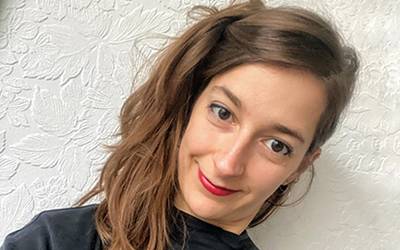Mirabai Galati - Medical Anthropology MSc
8 March 2021

In 2016 I moved to London from Bologna - Italy - to attend the MSc in Medical Anthropology at UCL. After a theoretically heavy BA in “Anthropology, Religion and Oriental Civilisations”, I wanted to get my hands dirty and learn more about actual applied research. Being this a research focussed MSc, it offered exactly what I was looking for. When I applied to the master, I wasn’t sure of what I wanted to do, career and life wise. What drew me to this MSc was its interdisciplinarity - the variety of courses offered and the chance of choosing them among the other anthropology masters programmes. Being exposed to different courses, seminars and programmes meant not being restrained by the course direction.
The programme taught me how to integrate different theories from the field of anthropology, while designing a research project. The MSc approaches the intersections between the socio-cultural, environmental, economical and political paradigms that influence social wellbeing of communities around the world, while at the same time providing its students with a strong research methodology knowledge. In undertaking the master, I learnt how to plan, conduct and present a variety of projects applying both qualitative and quantitative research methods. This allowed me not only to satisfy my curiosity for various subjects, but, in the end, set the basis for my current career as user researcher.
I attended courses exploring topics such as the relationships between our culture and medicine or the digital world or how our society approaches and thinks about gender or women’s health. Being able to express my ideas in a safe space while being challenged by others' perspectives is what I enjoyed the most during classes and debate dedicated moments. Being a thought in-campus course, I was exposed to researchers, teachers and students from all over the world, with different backgrounds and interests. Teachers’ availability to chat, whether it was after class, during open office hours or in the communal areas, made the whole experience enjoyable, creating a sense of openness and feeling welcomed. Despite the MSc focus on Medical Anthropology, I was able to explore in writing essays and projects assignments, topics of my own choosing. Supported by evidence and a vaste biography, I managed to write the final dissertation on a topic in line with my personal interests and less aligned with the UCL framework. This freedom was extremely important to me and I appreciate having been given this opportunity.
After graduation I was sure I wanted to be a researcher. However, I was uncertain regarding which field I wanted to apply my knowledge to. Moving forward a couple of years, in 2019 I applied for user research roles in the public sector. After a 3 months internship at Croydon Council, I became a member of their staff covering a junior user researcher role working on their website redesigning project. In October 2020, I took up a user researcher position at the Office for National Statistics and became a civil servant. I chose this career as it combines some of the passions that drove me to anthropology in the first place: an interest for others’ perspective, hearing about people's experiences, technologies and their impact on society. Looking back now, I can say that the many transferable skills I developed at UCL helped me choose the career path I then undertook. I now effectively use these skills to topics and debates within fields across science, public health, politics, gender studies and many more. Eventually, what I learnt at UCL was the capacity to ask the right questions. Indeed, the MSc not only gave me the tools to challenge and problematise the accepted norm, but it also helped me refine a critical framework I am still applying today to my everyday life.
 Close
Close

